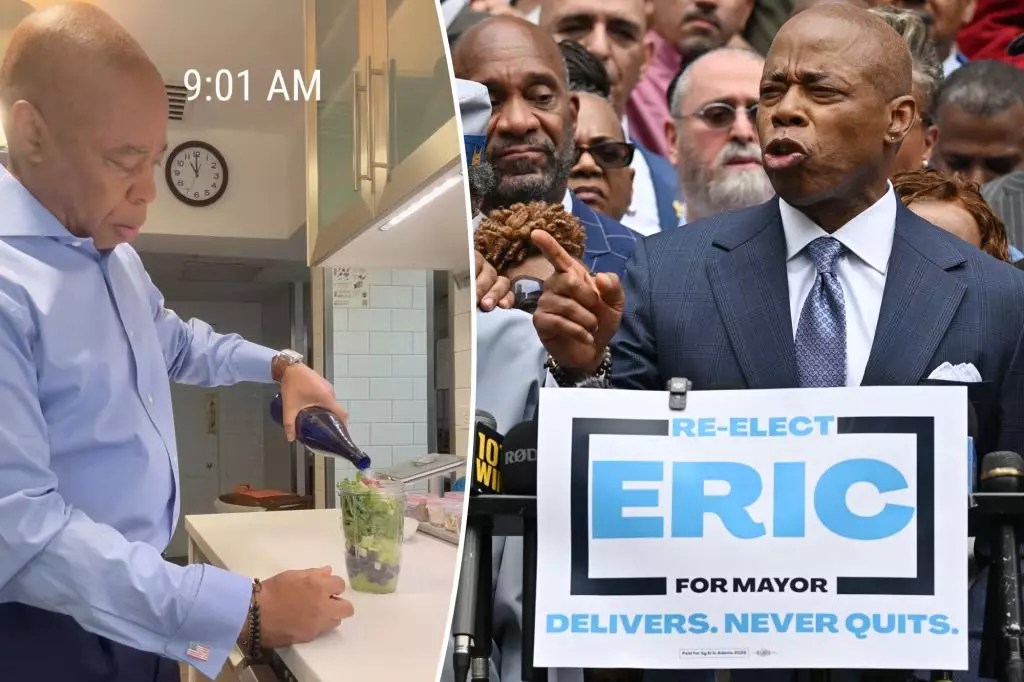New York City Mayor Eric Adams is taking an unconventional approach to political campaigning by blending influencer culture with his public persona. Rather than adhering to the traditional, polished image expected of elected officials, Adams has embraced the candid, relatable style popular on platforms like TikTok and Instagram. His posts range from “Get Ready With Me” videos to casual glimpses of everyday routines—such as ironing his shirts—a move many politicians would shy away from. This deliberate choice reflects a savvy understanding of modern media consumption: the electorate no longer just wants polished speeches and carefully curated events; they want a glimpse of leaders as authentic, accessible human beings.
Adams isn’t just dabbling in viral content; he is going “all-in” as he pitches himself for reelection. His Instagram and other digital channels showcase moments that typically belong to lifestyle vloggers, not civic leaders. Watching a mayor meticulously iron his pants or prepare a smoothie might seem trivial or even kitschy, yet it taps into a growing desire for genuineness and relatability in leaders. Social media today rewards vulnerability and everyday moments, and Adams seems eager to capitalize on that dynamic. For a city as diverse and fast-paced as New York, this approach is a bold experiment in shrinking the distance between government and citizens.
Adapting to a Media Landscape That Has Moved On
Adams’ strategy to bypass traditional, “legacy” media outlets and engage directly with the public through streaming and social platforms signals a critical shift in campaign communication. He openly expresses frustration with what he perceives as media neglect, noting that these platforms give him an unfiltered voice. Streaming and social media let Adams craft his narrative on his own terms, an indispensable advantage in a hyper-competitive political environment. His choice to appear on YouTube shows and other streaming services points to a keen awareness that the future of political communication lies beyond newspapers, TV, and even conventional online news.
This shift is emblematic of a broader trend, where politicians worldwide are becoming social media content creators, balancing policy messaging with entertainment. Adams’ candid acknowledgment that social media is “the game” reflects pragmatism rather than mere trend-chasing. The political arena today demands fluency in platforms that reward engagement, humor, and a certain casual charisma. Adams aims to be not just a politician but a personality, leveraging his presence to maintain relevance and connection with a digitally native electorate.
Authenticity as a Political Brand
Perhaps the most striking element of Adams’ digital persona is his unapologetic candidness. He openly shows aspects of himself that would likely be edited out of traditional political coverage, such as enjoying a cigar or sipping bourbon. This is a calculated risk; embracing imperfections and ordinary pleasures can alienate some constituents but also deepens trust among others who crave honesty over polished façades. Adams’ insistence on “showing who I am every day” suggests a new political branding ethos focused on authenticity rather than perfection.
This willingness to expose the “human” side of politics marks a departure from the era when leaders were expected to live behind a veil of decorum. In an age where audiences are increasingly skeptical of polished messages, Adams’ model acknowledges the power in vulnerability and transparency. Whether this will translate into electoral success or simply boost his social media following remains to be seen, but it undeniably sets a precedent for future candidates who want to connect in more intimate ways with voters.
The Shadow of Past Controversies and Moving Forward
While Adams invests heavily in cultivating this approachable image, he does not shy away from addressing darker chapters in his public life. His past entanglement in a federal bribery and corruption indictment, followed by a pardon from former President Donald Trump, adds complexity to his story. Adams insists on his innocence and claims to have been unfairly targeted, emphasizing that any wrongdoing was the actions of those around him, not his own.
This narrative serves a dual purpose: it humanizes him as someone who has endured trials and emerged resilient, and it preempts political attacks from opponents. His openness about this issue contrasts with the more common political tactic of minimizing such controversies. Though Adams avoids explicitly courting Trump’s endorsement, his acceptance of any support rooted in love for New York signals strategic openness to a broad coalition.
The way Adams navigates this terrain—balancing transparency about his past with a forward-looking campaign fueled by social media savvy and authentic self-presentation—illustrates the increasingly multifaceted nature of political leadership in the digital age. Whether or not this blend of influencer-style engagement and political accountability proves sustainable, it undeniably challenges what voters expect from their elected officials today.


Leave a Reply